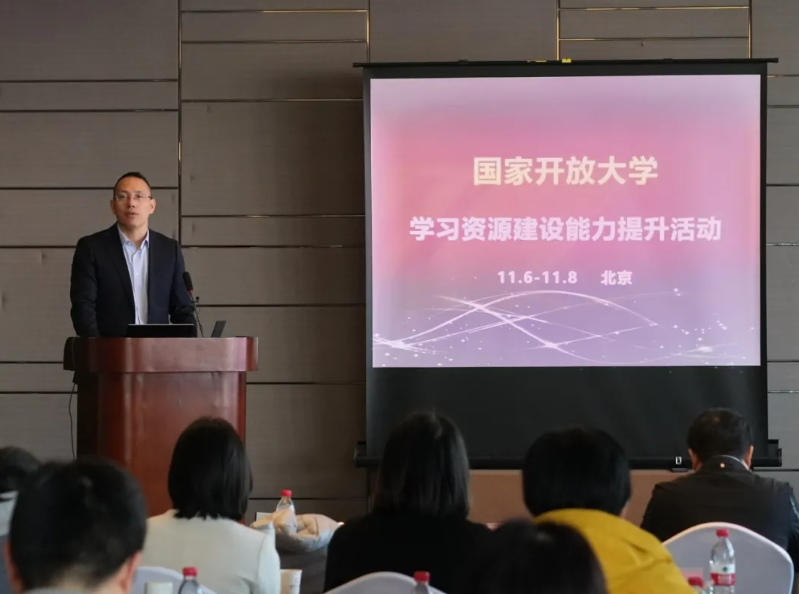 From 4 to 8 November 2024, the Open University of China (OUC) organised a series of activities focused on the presentation of model course and resource development plans, as well as capacity-building initiatives.
From 4 to 8 November 2024, the Open University of China (OUC) organised a series of activities focused on the presentation of model course and resource development plans, as well as capacity-building initiatives.
These efforts aim to implement the guiding principles of the 20th National Congress of the Communist Party of China, the Third Plenary Session of the 20th Central Committee, and the National Conference on Education, emphasising the reform of open education course resources and enhancing the quality of talent cultivation in open education. Li Song, a member of the Party Committee and vice president of the OUC, attended the event. The event also featured guidance from 12 experts, including national-level experts from five "Double First-Class" universities such as Tsinghua University and Peking University, as well as industry experts from Higher Education Press and Beijing Radio and Television Station. Over 90 participants, including relevant teachers and department heads from nine schools at the headquarters and 17 branches within the system, as well as leaders from the Department of Student Affairs and Teacher Development, and the Department of Digitalisation, took part in the activities. The event was hosted by Li Wei, director of the Learning Resources Department of the OUC.

Li Song attended the event and delivered a speech.
Li Song outlined expectations and requirements for the first batch of model courses and resources at the headquarters of the OUC, as well as the incubation projects for high-quality provincial courses at the branches. First, he emphasised the importance of prioritising and advancing the reform and innovation of the university's course resources. Li Song noted that these two projects are crucial measures for the Open University in its transformation and reform in the new era, aiming to build core competitiveness in course resources and enhance the quality of talent cultivation. The objective is to create high-quality courses that are "socially recognised and well received by students". Second, he highlighted the necessity to clearly define the positioning and develop course resources with the characteristics of open education. This involves adhering to the principle of moral education, emphasising ideological and value orientation, and organically integrating ideological and political elements. It is essential to align with adult learning principles, accurately identify learners' real needs, and strengthen instructional design. The reform should be empowered by digital intelligence, utilising new technologies to address issues and improve outcomes, ensuring technology serves education. Demonstrating leadership in innovation is key, with a commitment to building first-class open education courses to high standards and strict requirements. Third, he called for a strong and orderly approach to steadily advance the successful completion of course resource development. This requires comprehensive planning, attention to phased acceptance, research and demonstration, incorporation of expert suggestions, and close collaboration to harness collective wisdom and jointly create high-quality course resources.
During the event, experts focused on themes such as course content design, course development and production, AI and digital intelligence empowerment, integration of ideological and political education into courses, knowledge graph construction, learning evaluation design, and video language expression. They shared insights and provided guidance on course development.
The event received an enthusiastic response. Liu Tengfei, a teacher from the School of Economics and Management at the headquarters, stated that the targeted feedback from experts provided new ideas for improving project plans. Liu Shan, a teacher from the Gansu Branch, mentioned gaining new perspectives on how to integrate existing course resources, utilise different media to convey knowledge points, design engaging instructional content, and assess and optimise the effectiveness of course resources, which greatly aided in enhancing course development capabilities.
The model course and resource development projects at the headquarters of the OUC, along with the incubation projects for quality elective course resources at the branches, are concrete measures to deepen teaching reform and improve the quality of open education course resource development. Currently, 91 incubation courses have been approved and initiated, and these courses will be ongoing implemented through mid-term inspections, expert guidance, final evaluations, and results display and selection.
Moving forward, the OUC will continue to adopt various forms to systematically advance the development of model courses and resources at the headquarters and branches, striving to create exemplary, high-quality, and benchmark course resources, thereby providing stronger support for the high-quality development of open education.
Written by Liu Jing and Yang Wei, photo by Learning Resources Department, OUC